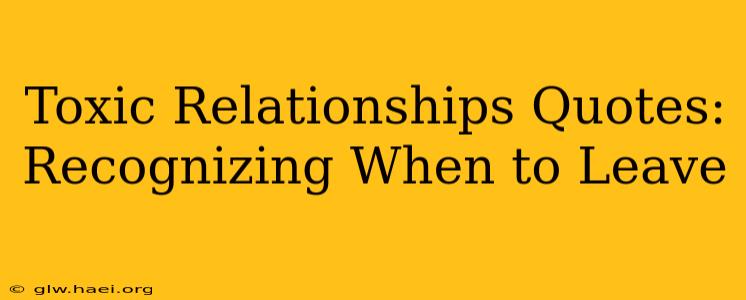Toxic Relationships Quotes: Recognizing When to Leave
The air crackled with unspoken tension. It wasn’t a dramatic explosion, more a slow, insidious drip of negativity that had poisoned everything. That’s how it often begins, the subtle erosion of self-worth in a toxic relationship. We tell ourselves it's just a rough patch, that things will get better. But sometimes, the harsh reality is that some relationships are beyond repair, leaving us drained, depleted, and questioning our own sanity. This isn't about blame; it's about recognizing the signs and understanding when it's time to prioritize your well-being and leave.
What are the signs of a toxic relationship?
This isn't about a few disagreements; it's about a persistent pattern of behavior that erodes your happiness and sense of self. Think constant criticism, gaslighting (making you question your own reality), control, manipulation, and a consistent lack of respect. These aren't fleeting moments; they're the foundation of a toxic dynamic.
One day, while scrolling through quotes about relationships, a particular one resonated deeply: "A relationship should lift you up, not drag you down." That simple sentence became my wake-up call.
How do I know if it's time to leave a toxic relationship?
The decision to leave a toxic relationship is monumental, often filled with fear, uncertainty, and a rollercoaster of emotions. But before the fear paralyzes you, remember this: your worth transcends any relationship. You deserve to be happy, respected, and valued.
What are some examples of toxic relationship behaviors?
Toxic relationships manifest in countless ways, making it challenging to pinpoint the exact moment things went wrong. Let’s explore some common behaviors:
1. Constant Criticism and Belittling: This goes beyond constructive feedback; it's a relentless barrage of negativity designed to undermine your self-esteem. Remember that quote: "The best relationships are built on trust, respect, and a shared vision. The rest are just a bunch of drama." If your relationship lacks those fundamentals, it's worth re-evaluating.
2. Control and Manipulation: Are your choices constantly questioned or dictated? Do you feel pressured to conform to their expectations, even at the expense of your own needs and desires? This is a significant red flag.
3. Gaslighting: This insidious tactic makes you question your own sanity and perception of reality. They might deny events that happened, twist your words, or make you feel like you're imagining things. A trusted friend or therapist can provide invaluable support during such times.
4. Isolation: Do they try to cut you off from friends and family? This isolates you and makes you more dependent on them, giving them more control.
5. Emotional Abuse: This is often subtle but devastating. It involves the constant undermining of your self-worth, through criticism, insults, or silent treatment.
6. Physical Abuse: This is the most severe form of abuse and requires immediate action. If you’re experiencing physical violence, seek help immediately. Your safety is paramount.
How can I leave a toxic relationship safely?
Leaving a toxic relationship can be dangerous, particularly if abuse is involved. Here’s what you need to know:
1. Plan your escape: Don’t announce your intentions suddenly. This could escalate the situation. Plan your exit carefully, ensuring you have a safe place to go and support from trusted friends, family, or a domestic violence shelter.
2. Seek support: Talk to someone you trust, a friend, family member, therapist, or domestic violence hotline. Having a support system is crucial for your emotional and physical safety.
3. Document everything: Keep records of abusive incidents, including dates, times, and any evidence (texts, emails, photos). This can be invaluable if you need legal assistance.
4. Consider legal options: If necessary, seek legal advice to protect yourself and your assets.
What should I do after leaving a toxic relationship?
Healing takes time. Focus on self-care, rebuilding your self-esteem, and surrounding yourself with positive and supportive people. Therapy can be incredibly helpful in processing the trauma and learning healthy relationship patterns. Remember, you deserve to be happy and in a healthy relationship. The journey to healing is yours; embrace it with courage and self-compassion. You are stronger than you think.

